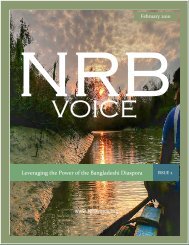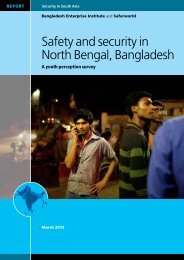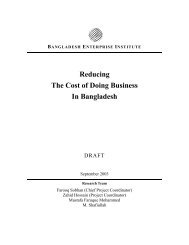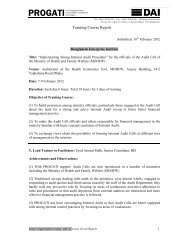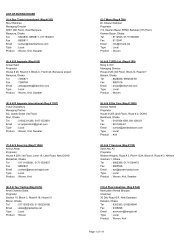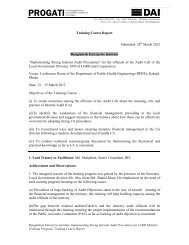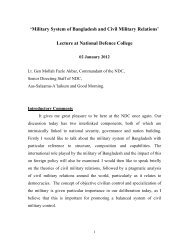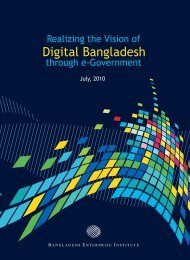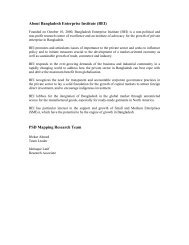Bangladesh Social Enterprise Project - Bangladesh Enterprise Institute
Bangladesh Social Enterprise Project - Bangladesh Enterprise Institute
Bangladesh Social Enterprise Project - Bangladesh Enterprise Institute
Create successful ePaper yourself
Turn your PDF publications into a flip-book with our unique Google optimized e-Paper software.
This book sees the poor as more than mere consumers at C K Prahalad's “bottom of the<br />
pyramid” and instead takes a strategic view of all the ways in which a multinational<br />
company can interact with and influence the lives of the poor. The poor face poverty traps<br />
when they seek to deal with an international company. Based on sound economic theory<br />
and emerging good business practice the book recommends low‐cost ways to overcome<br />
these traps and gain access to a larger and cheaper pool of employees and suppliers. The<br />
poor can also become a threat – to reputation and security – if relationships are badly<br />
managed. The book integrates concerns over political risk, legal failure and physical security<br />
into a business case for reducing poverty. It argues that country risk is something that can<br />
be actively reduced through economic development rather than passively managed with<br />
lawyers and guards.<br />
‘Make Poverty Business’ argues that doing business with the poor can be profitably<br />
integrated into the core operations of all multinational companies, not only in those<br />
consumer manufacturers who see a marketing opportunity or those major corporations<br />
who feel under PR pressure to do some cosmetic corporate social responsibility. The book<br />
examines the successes, failures and missed opportunities of a wide range of global<br />
companies including Wal‐Mart, BP, Unilever, Shell and HSBC when dealing with the poor<br />
and with development advocates in the media, NGOs, governments and international<br />
organisations. It includes a discussion on how to use a poverty perspective to provoke<br />
profitable innovation – not only to create new products and services but also to find new<br />
sources of competitive advantage in the supply chain and to develop more sustainable,<br />
lower‐cost business models in developing countries.” (Wiser Earth:<br />
http://www.wiserearth.org/resource/view/0cf98c40f9cccbeae7cf3e107ac03ffd )<br />
Yunus, M., 2007. ‘Creating a world without poverty: social business and the future<br />
of capitalism’<br />
This book was written by the famous Dr Mohammad Yunus, an economics professor and<br />
founder of the Grameen Bank. This is quite a readable book, and examines the ways in



